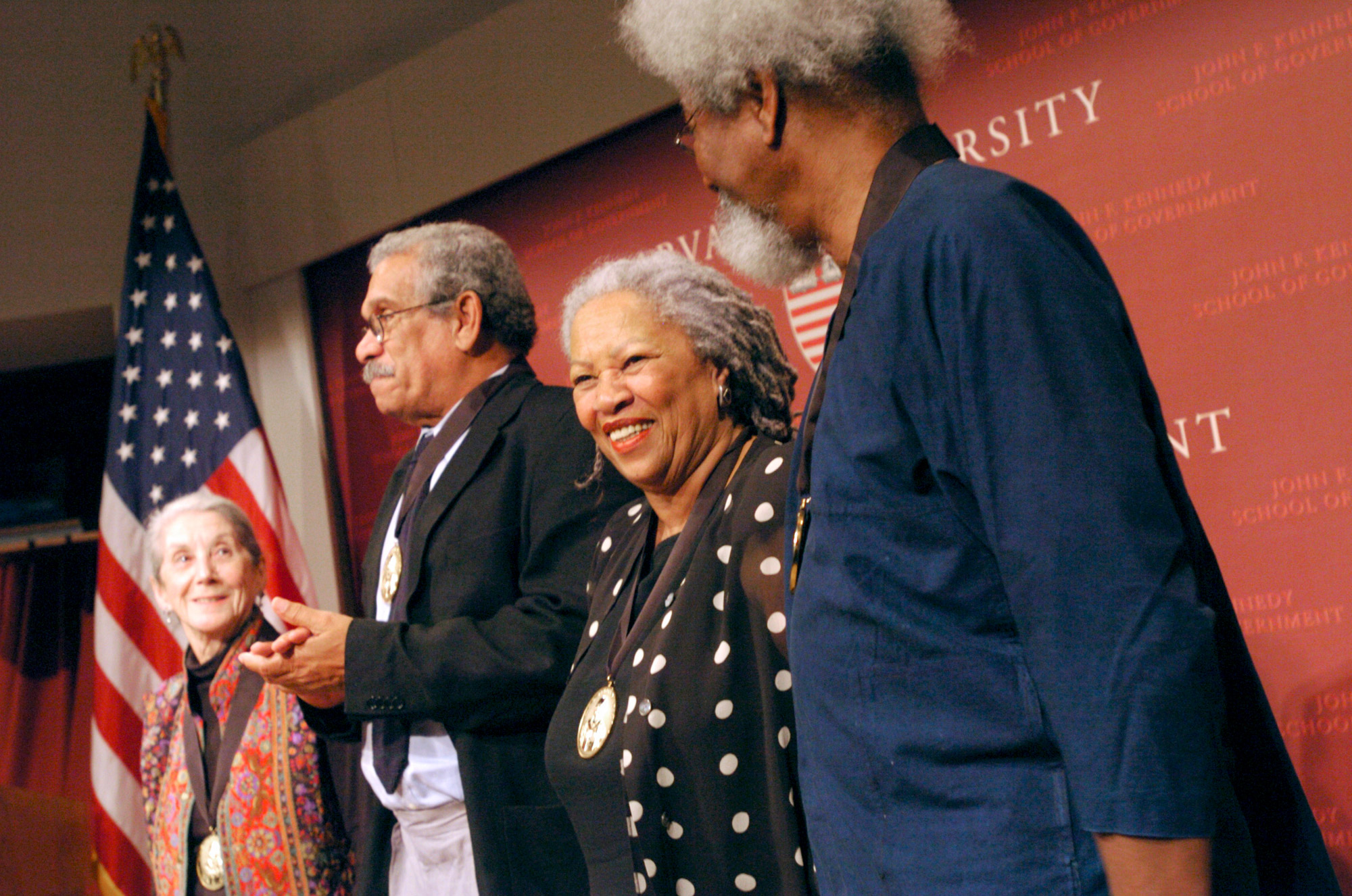
Nobel Prize winners in literature (from left) Nadine Gordimer, Derek Walcott, and Toni Morrison came together to celebrate the birthday of their peer, Wole Soyinka (right).
Photos by Stephanie Mitchell/Harvard University News Office
Soyinka feted by fellow Nobel Prize winners
Honored on 70th birthday
When Wole Soyinka, the first African writer to win the Nobel Prize in literature, turned 70, his native country of Nigeria celebrated his birthday with two solid weeks of festivities. Harvard could not fête the 1986 Nobel Prize winner in quite the same way, but it managed something equally impressive – a feast of words catered by three of the honoree’s fellow Nobel laureates.
“A Season of Laureates: Readings in Honor of the 70th Birthday of Wole Soyinka,” sponsored jointly by the W.E.B. Du Bois Institute for African and African American Research and the Kennedy School of Government’s Institute of Politics, took place April 27. The Nobel Prize winners who lent their voices to the affair were Nadine Gordimer (1991), Derek Walcott (1992), and Toni Morrison (1993). Du Bois Institute director Henry Louis Gates Jr., a longtime friend and colleague of Soyinka, hosted the event.
Held in the JFK Jr. Forum, the celebration attracted an overflow crowd, and latecomers had to be satisfied with watching the proceedings on closed-circuit television in an adjoining room. But whether viewed on screen or in person, the sight of four of the world’s most prestigious living writers sitting together on stage seemed to fill the audience with a sense of being present at a very special and festive occasion.
“Ladies and gentlemen, it is show time! Give it up once again for the Nobel laureates!” Gates declared, eliciting a second standing ovation. The first had occurred spontaneously when they walked onstage.
Soyinka, currently the Alphonse Fletcher Fellow at the Du Bois Institute, is a playwright, poet, novelist, and essayist, as well as a political activist who has been called “the conscience of Nigeria.” During Nigeria’s civil war, Soyinka appealed in an article for a cease – fire between the opposition groups and the government. As a result, he was arrested in 1967, accused of conspiring with the rebels, and held as a political prisoner for 22 months. He has been arrested nine times since then and at one time was tried in absentia and sentenced to death.
Nobel laureate Wole Soyinka on his 70th birthday.

Educated in Nigeria and in the United Kingdom, Soyinka earned a Ph.D. from Leeds University. He has worked as a dramaturge at the Royal Court Theatre in London and has held professorships in England, Africa, and the United States. Among his many plays are “The Lion and the Jewel,” “The Trials of Brother Jero,” “The Swamp Dwellers,” “The Road,” “Death and the King’s Horseman,” “A Play of Giants,” “Requiem for a Futurologist,” and “Beautification of Area Boy.”
He has also written two novels, “The Interpreters” and “Season of Anomy,” several volumes of poetry, critical essays, and two autobiographical narratives, “The Man Died: Prison Notes” and “Aké,” an account of his childhood.


Enjoying the birthday party are (from left) Evelyn Brooks Higginbotham, Werner Sollors, Emmanuel Akyeampong, and Ford Morrison, son of Toni Morrison. Nadine Gordimer was among the writers at Soyinka’s fête.
The selections that the Nobel laureates chose to read were as varied as they were mesmerizing. Gordimer read a short story, told in the voice of a young African girl, about a group of refugees who travel across a game reserve to escape the civil war in their country. Walcott read a section of a play based on Homer’s “Odyssey” that portrays Odysseus’ adversary, the Cyclops, as a Big Brother-like dictator. Morrison read a section of her latest novel, “Love” (2003), in which an elderly woman reminisces about her life at a seaside resort that has seen better days.
Soyinka, who clearly has not allowed repression and injustice to impair his sense of humor, stepped to the microphone and declared, “I believe in karma. I know this to be true because I have lived a blameless life, so why was I inflicted with this phenomenon called Skip Gates? But then who else could have succeeded in bringing us all together and given me the immeasurable delight of being here?”
After asserting his dislike for autobiography and his aversion to becoming known for books with titles like “‘Soyinka,’ ‘Son of Soyinka,’ and ‘Soyinka Writes Again,’” he admitted that the passage he had chosen to read was in fact from an autobiographical volume he was working on. Titled “A Digression on the Purpose of Accidents,” the passage humorously discussed Soyinka’s exasperation with Westerners who are too fixated on the letter of the law to recognize good fortune when it happens to them and his conviction that the proper observance of ritual (such as sacrificing a cockerel in a theater basement) can mysteriously redeem a jinxed production.
The question-and-answer period produced some memorable remarks on the creative process and the relation of art to life.
Gordimer on what makes a person a writer: “It’s a mystery. You’re either born with this particular ability or you are not. The most important quality is a hypersensitivity to other people, to what they say, and what they don’t say.”
Morrison on the place of writing in a person’s life: “Writing is where I go to be completely free, where no one can tell me what to do.”
Walcott on writing and politics: “I don’t know that any writer deliberately separates politics and writing. Nobody wants to be a martyr, but if you go through that experience, you often find a strength that astonishes you. The quality of human endurance is an astonishing thing.”
Soyinka on the relation between writing and experience: “It is a matter of heart and imagination. As Arthur Miller showed in ‘The Crucible,’ you don’t have to undergo an experience to empathize with someone else’s situation.”




